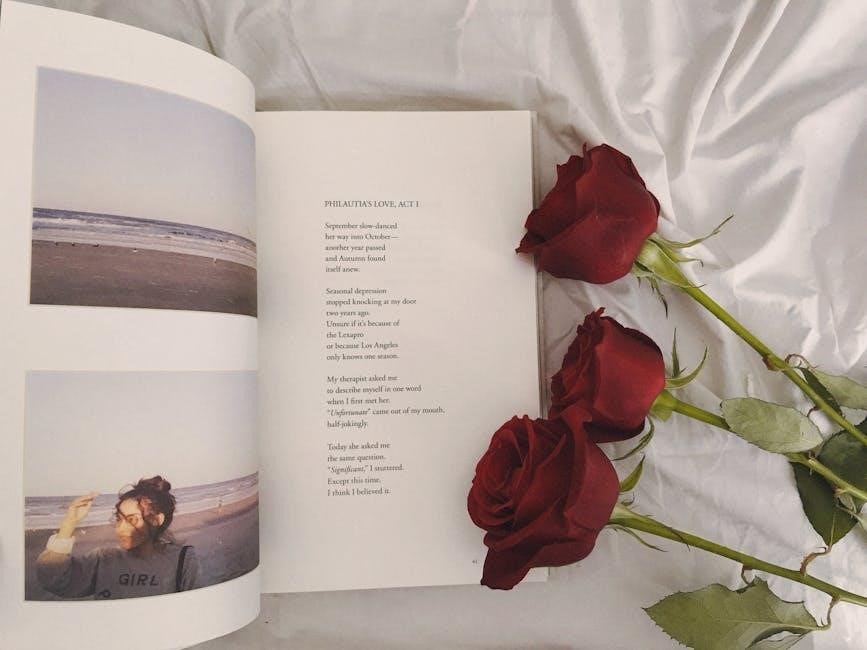“Richard Cory,” a poem by Edwin Arlington Robinson, examines the illusion of wealth and isolation․ The PDF version reveals a man whose outward grandeur conceals inner despair, contrasting societal admiration with personal tragedy, highlighting themes of appearance versus reality and emotional isolation․
Overview of the Poem and Its Significance
Richard Cory, a poem by Edwin Arlington Robinson, is a profound exploration of societal illusions and personal despair․ The poem narrates the life of Richard Cory, a wealthy man admired by townspeople for his elegance and grace․ However, beneath his polished exterior lies a deeply troubled individual who ultimately takes his own life․ The poem’s significance lies in its ability to challenge superficial judgments and highlight the disconnect between appearance and reality․ Its concise yet impactful structure, combined with its ironic tone, makes it a timeless commentary on wealth, isolation, and the human condition․ The PDF version of the poem, widely available online, allows readers to delve into its themes and analyze its literary brilliance in depth․

About the Poet
Edwin Arlington Robinson, born in 1869 in Maine, was a renowned American poet known for his realistic and often somber portrayals of life․ His work, including Richard Cory, explores themes of isolation and human nature, earning him a significant place in American literature․
Biography of Edwin Arlington Robinson
Edwin Arlington Robinson, born in 1869 in Maine, was a prominent American poet known for his deep exploration of human nature and isolation․ He began writing poetry at an early age, despite financial hardships, and gained recognition through the support of President Theodore Roosevelt․ Robinson’s work often depicted New England life, blending realism with emotional depth․ His poem Richard Cory remains a classic, reflecting his ability to uncover the complexities beneath outward appearances․ His legacy endures as a significant figure in American literature․
His Place in American Literature
Edwin Arlington Robinson holds a distinguished place in American literature for his profound exploration of human nature and societal issues․ His realistic yet empathetic portrayal of New England life, as seen in works like Richard Cory, earned him critical acclaim․ Robinson’s poetry, known for its psychological depth and concise narrative style, influenced modern poetry and solidified his reputation as a master of character-driven verse․ His ability to evoke universal themes through relatable characters continues to resonate, making him a cornerstone of early 20th-century American poetry․
Poem Structure and Style
The poem features a structured, 16-line format with an ABAB rhyme scheme․ Its simple rhythm and calm tone contrast with the tragic irony of Cory’s hidden despair․
The Use of Tone and Irony
The poem employs a calm and respectful tone, contrasting sharply with its tragic conclusion․ This contrast creates dramatic irony, as the townspeople admire Cory, unaware of his despair․ Robinson’s choice of tone highlights the gap between Cory’s polished exterior and his internal struggles, emphasizing the theme of appearance versus reality․ The irony lies in the townspeople’s envy of Cory’s wealth and status, while he himself finds life unfulfilling, leading to his shocking suicide․ This ironic twist underscores the poem’s critique of societal perceptions of success and happiness․
Rhyme and Rhythm in the Poem
The poem features a consistent rhyme scheme of abab, adding a subtle musicality that underscores its reflective tone․ The rhythm, primarily in iambic tetrameter, creates a steady, measured pace, mirroring the deliberate and controlled demeanor of Richard Cory․ This structure enhances the contrast between the calm exterior and the hidden turmoil, contributing to the poem’s emotional depth․ The use of rhyme and rhythm also heightens the irony, as the poetic form suggests order and harmony, while the narrative reveals a life in disarray and tragic end․

Themes and Symbolism
The poem explores themes of wealth, class, and isolation, using Richard Cory as a symbol of societal illusion․ His tragic end reveals the emptiness behind material success․
The Contrast Between Appearance and Reality
The poem masterfully contrasts Richard Cory’s polished exterior with his inner turmoil․ Cory appears as a refined, admired gentleman, yet his suicide reveals profound unhappiness beneath․ This stark juxtaposition highlights the illusion of wealth and status, showing how outward perfection can mask internal despair․ The townspeople’s admiration versus Cory’s isolation underscores the theme that appearances often deceive, emphasizing the gap between societal perception and personal reality․ This contrast is central to the poem’s emotional impact and thematic depth, leaving readers reflective on the dangers of judging others by surface appearances alone․
Themes of Wealth, Class, and Isolation
The poem explores the themes of wealth, class, and isolation through Richard Cory’s character․ Despite his affluence, Cory’s life is marked by profound loneliness and disconnection․ His wealth and social status create a barrier, preventing genuine human connection․ The townspeople envy his outward perfection, yet Cory’s suicide reveals the emptiness beneath his privileged existence․ This critique of wealth and class highlights how material success can fail to fulfill emotional and social needs, leaving individuals isolated despite their outward appearances of happiness and fulfillment;

Analysis of Richard Cory’s Character
Richard Cory is portrayed as a wealthy, respected gentleman whose suicide shocks the townspeople, revealing the stark contrast between his outward admiration and inner isolation․
The Townspeople’s Perception of Richard Cory
The townspeople viewed Richard Cory with admiration and envy, seeing him as a refined gentleman whose wealth and elegance set him apart․ His polite demeanor and composed appearance reinforced their perception of him as a man of distinction․ However, his suicide revealed the stark contrast between his outward prosperity and inner turmoil, shocking those who idealized him․ This disparity underscores the theme of appearance versus reality, highlighting the isolation beneath his polished exterior․
The Tragic Ending and Its Emotional Impact
Richard Cory’s suicide shocks the townspeople, contrasting sharply with their admiration for his polished demeanor and wealth․ The PDF reveals his inner turmoil beneath his refined exterior, exposing the isolation and despair hidden by his grandeur․ This unexpected twist evokes profound sadness, as the man they envied for his supposed happiness ends his life, leaving a haunting reflection on the illusion of prosperity and the true cost of isolation․ The poem’s emotional impact lies in its stark revelation of the disparity between appearance and reality, resonating deeply with readers․
Historical Context
The poem reflects late 19th-century societal issues, contrasting wealth with poverty, and highlights the pressures of maintaining appearances, offering insight into Robinson’s commentary on class divisions during his era․
The Poem’s Reflection of Societal Issues
Edwin Arlington Robinson’s “Richard Cory” portrays societal issues through its depiction of class disparities and isolation․ The poem highlights the contrast between Cory’s wealth and the townspeople’s struggles, reflecting the social tensions of the late 19th century․ Cory’s suicide underscores the emotional toll of societal expectations and the illusion of happiness wealth often promises․ This critique resonates with themes of economic inequality and the pressures of maintaining a perfect facade, offering a timeless commentary on human experience and societal structures;
Robinson’s Inspiration for the Poem
Edwin Arlington Robinson drew inspiration for “Richard Cory” from his observations of New England life and societal dynamics․ The character of Richard Cory is believed to have been influenced by a local figure, possibly someone known for their wealth and isolation․ Robinson’s interest in human psychology and the contrast between appearance and reality drove the poem’s narrative․ His ability to weave dramatic irony and tragedy into a seemingly ordinary life reflects his deeper exploration of societal pressures and the complexities of human existence, making “Richard Cory” a profound commentary on class and individual struggles․

Downloading the Poem as a PDF
Download the Richard Cory poem as a PDF from reputable sources like Poetry․com․ It’s free and easy to access for reading and educational purposes․
Where to Find the PDF Version
The PDF version of Richard Cory is available on various platforms․ Websites like Poetry․com and educational databases offer free downloads․ Additionally, the poem can be found on the University of Toronto’s Representative Poetry Online․ It is also included in lesson plans and literary resources, making it easily accessible for reading and study purposes․ Ensure to use reputable sources for the best quality and accuracy of the text․
Benefits of Reading the PDF
Reading the PDF of Richard Cory offers convenience and clarity․ The formatted text enhances readability, preserving the poem’s original structure and rhyme․ It allows for offline access, enabling deeper analysis without interruptions․ The PDF also often includes annotations, summaries, and analysis, enriching the reader’s understanding of themes like isolation and societal illusion․ This version is ideal for academic purposes, providing a reliable resource for study and reflection on Robinson’s timeless masterpiece․
Cultural and Literary Impact
The poem Richard Cory has left a lasting impact on literature, exploring themes of wealth, isolation, and societal illusion․ Its timeless relevance continues to inspire adaptations and interpretations, resonating with readers across generations․
The Poem’s Influence on Literature
Richard Cory’s exploration of wealth, isolation, and societal illusion has deeply influenced American literature․ Its concise yet profound structure inspired poets to explore similar themes of human complexity․ The poem’s dramatic irony and unexpected ending have made it a benchmark for storytelling in poetry, encouraging writers to experiment with narrative techniques․ Additionally, its focus on character psychology has influenced modernist poetry, emphasizing the inner lives of individuals․ As a result, Richard Cory remains a foundational text in literary studies, shaping how poets and writers approach themes of identity and societal perception․
Adaptations and Interpretations
Richard Cory’s timeless themes have inspired various adaptations, including a famous song by Simon & Garfunkel, which captures the poem’s essence of wealth and isolation․ Educational materials, such as PDF lesson plans, have also been developed to explore its deeper meanings․ The poem’s dramatic irony and tragic ending have been interpreted in stage performances and literary analyses, highlighting its universal appeal․ These adaptations reflect the poem’s enduring relevance, allowing new audiences to connect with its exploration of societal illusion and human complexity․
The poem “Richard Cory” masterfully explores the contrast between appearance and reality, leaving readers with a profound reflection on wealth, isolation, and societal illusions, available as a PDF for deeper analysis․
Final Thoughts on “Richard Cory”
Edwin Arlington Robinson’s Richard Cory masterfully explores themes of wealth, isolation, and societal illusions․ The poem’s tragic conclusion underscores the contrast between Cory’s polished exterior and his inner despair, leaving readers with a haunting reflection on the complexities of human experience․ The PDF version of the poem offers a convenient way to engage with its profound commentary on class and appearances, ensuring its timeless relevance in literary discussions and personal reflection․
